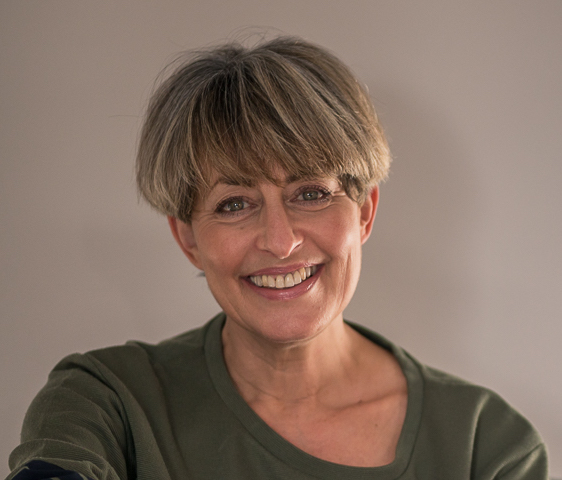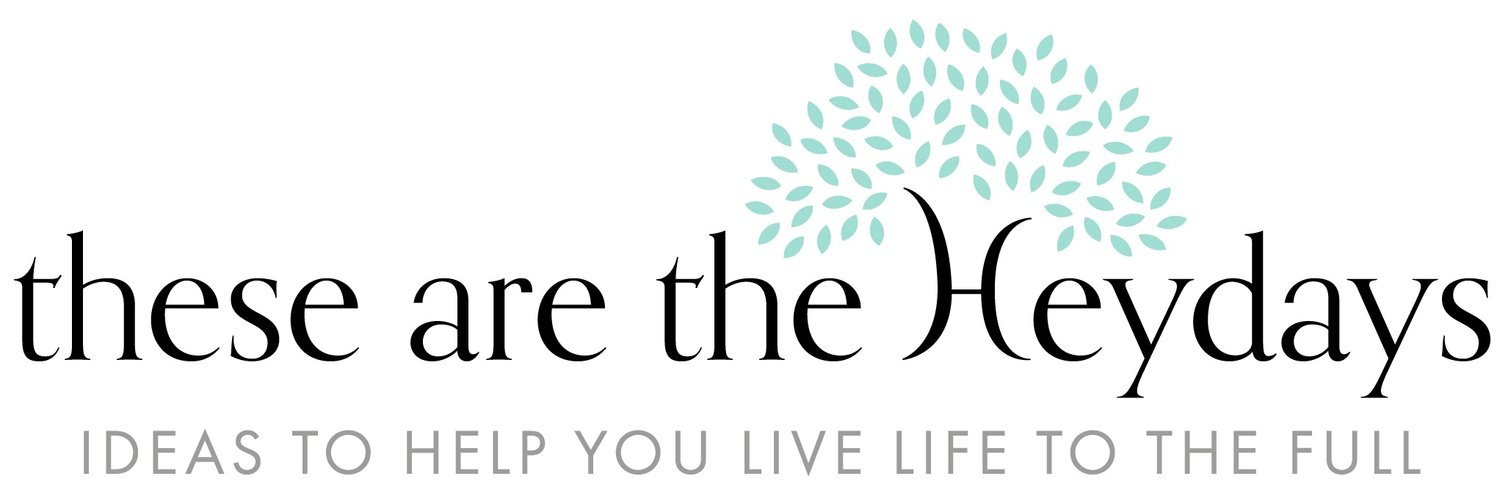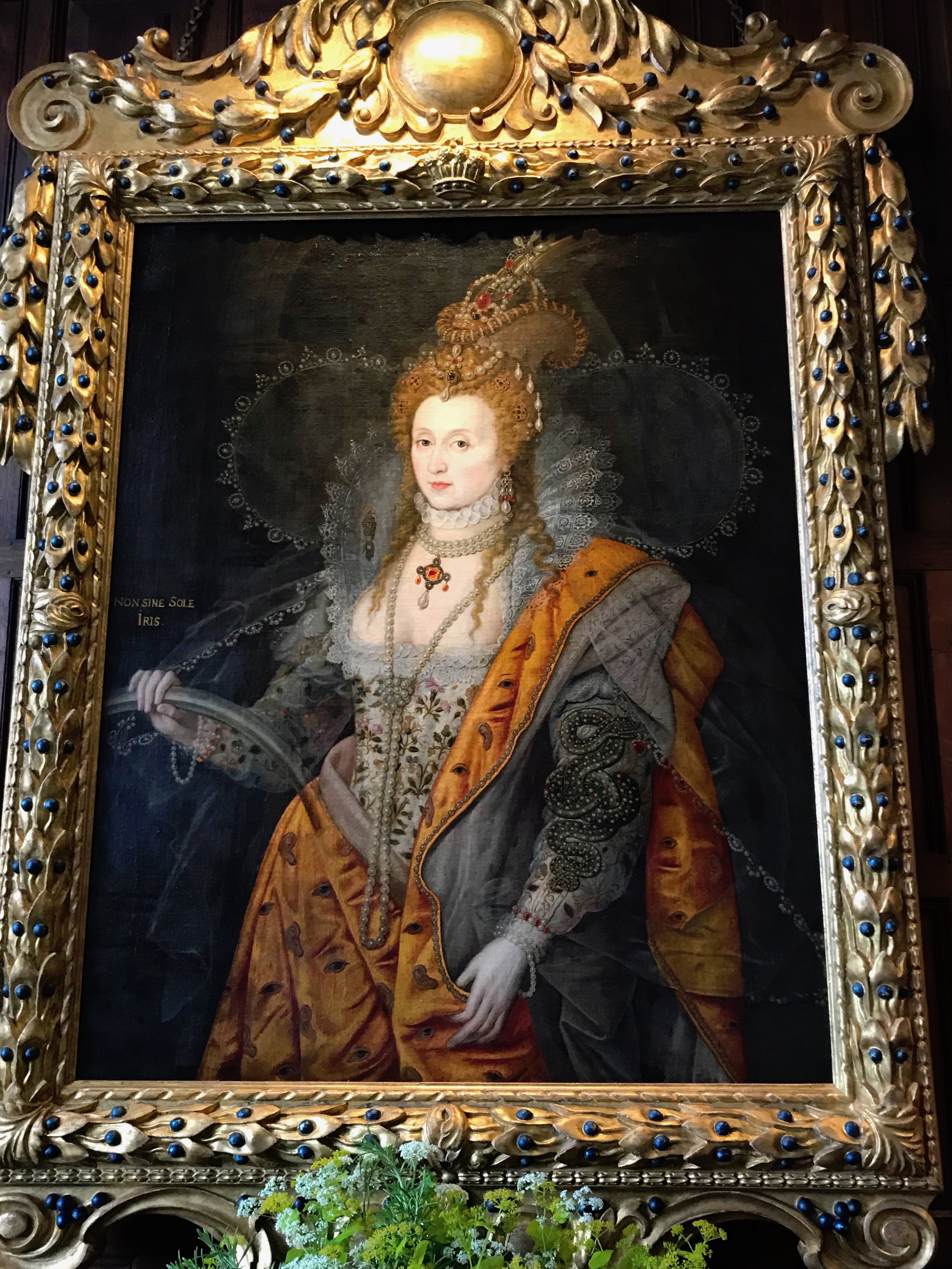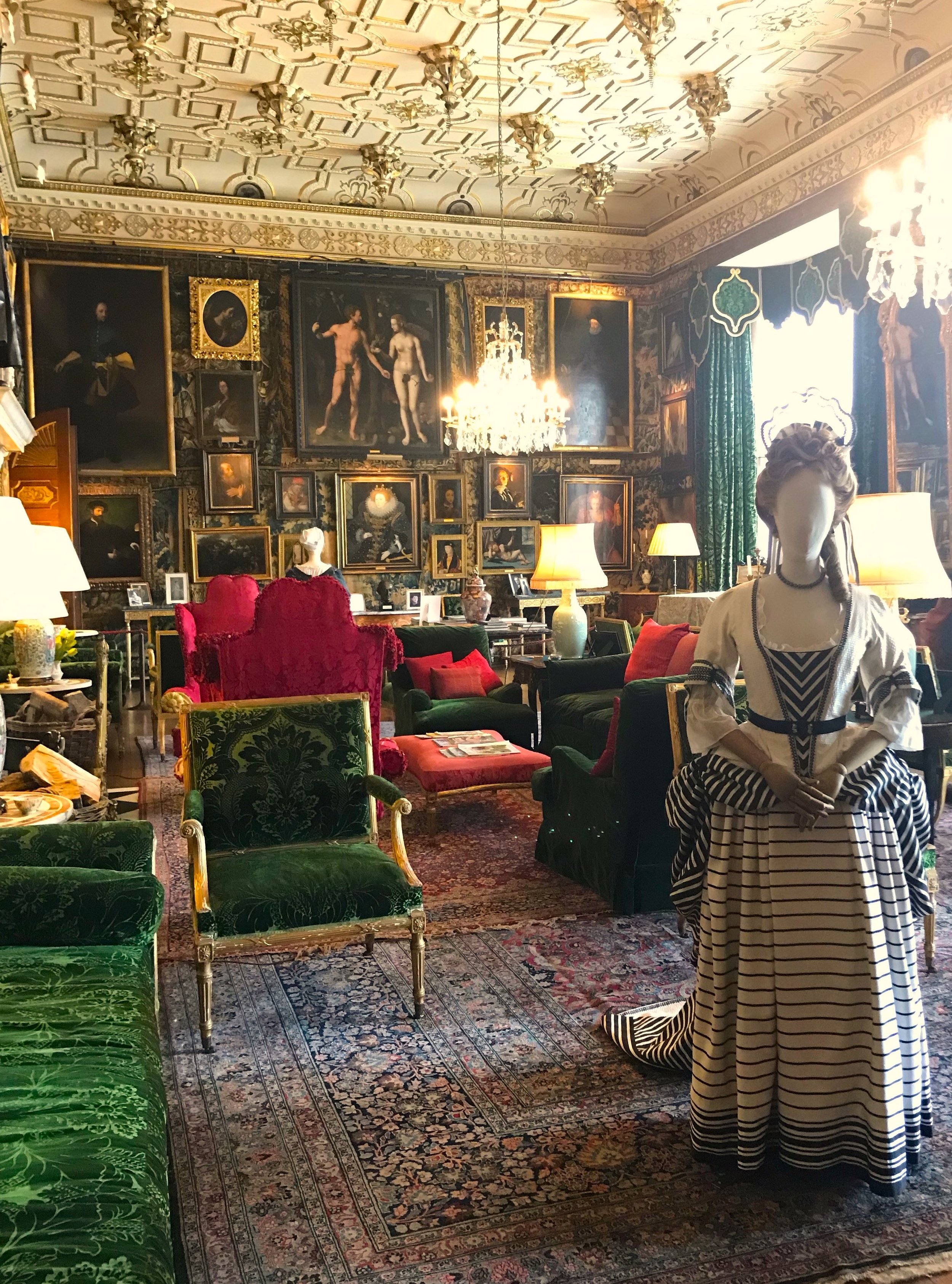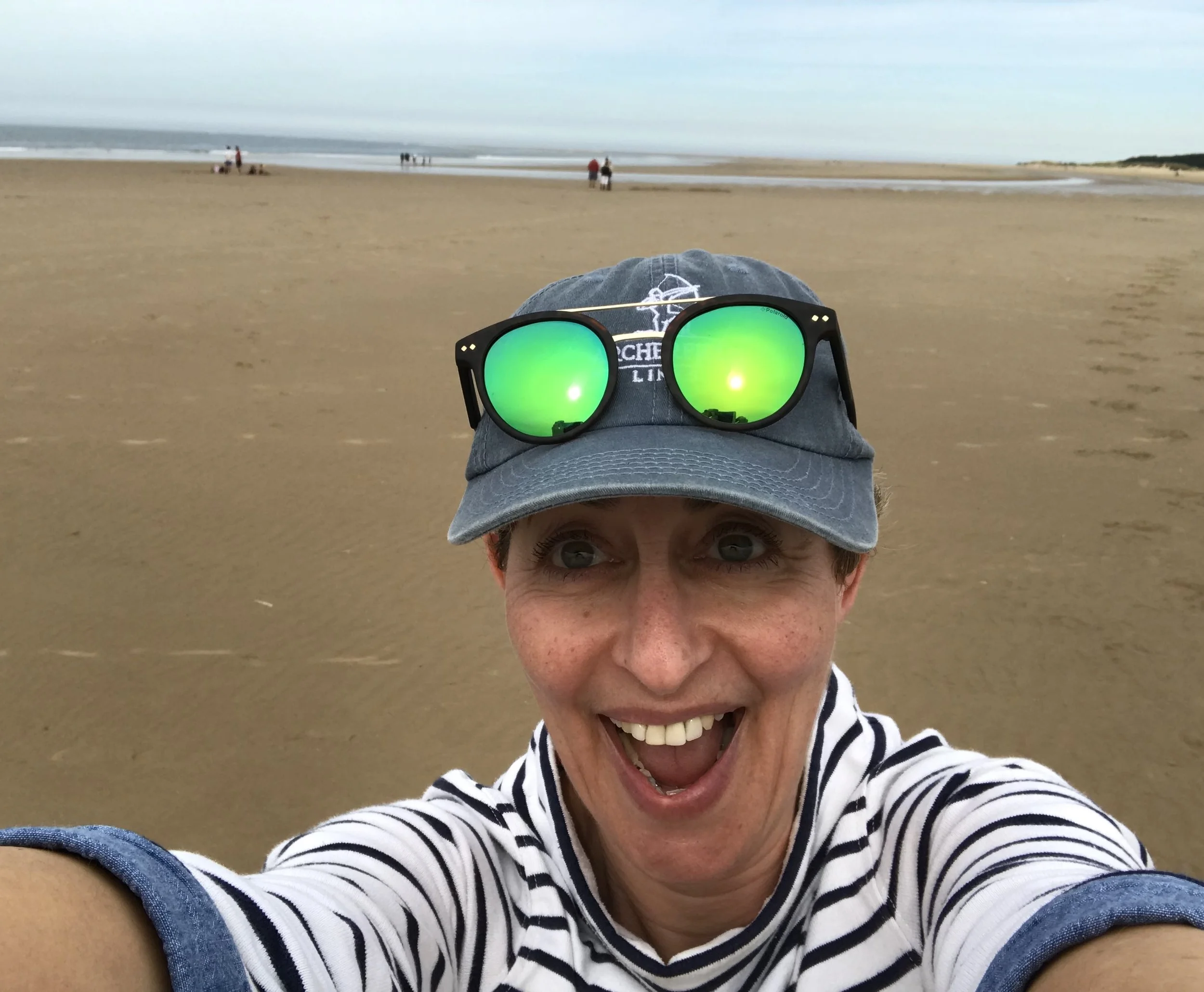See costumes from The Favourite on display in Hatfield House
Are you a fan of any of the following?
Beautiful historic houses
Visiting film locations
Seeing film costumes up close
Any, or all, of the cast of The Favourite
If the answer to one, more or all of those is ‘yes indeed’, then head to Hatfield House in Hertfordshire before June 7th and you can experience all of them in one fascinating, enjoyable go.
The rear facade of Hatfield House. Visitors enter through the door in the centre.
Because not only can you literally walk in the footsteps of the cast of the Oscar nominated, BAFTA winning film, until June 7th you can also see some of the magnificent costumes from the film in the actual rooms where they were shot.
Costumes worn by Emma Stone, Nicholas Holt for The Favourite, on display in Hatfield House
Hatfield House is more than worth visiting any time (it’s open from April to September). The impressive Jacobean mansion was built adjoining the site of the Old Palace by Robert Cecil, 1st Earl of Sailsbury, in 1611 and the Cecil family still occupy one wing to this day. (There’s a delightful reminder of this in the Armoury, towards the end of the house tour, where the full view of the long room, with its walls lined with suits of armour, and, rather incongruously, examples of children’s toys from throughout the history of the house, is broken by a painted screen, beyond which are a distinctly un-historical table tennis table and table football table.)
Ancient and modern - toys (and the odd suit of armour) played with by past occupants on display. Toys from today, in use by the current inhabitants
The Old Palace (which can be hired as a venue and is where my daughter had her wedding earlier this year) and the deer park surrounding the house had been owned by Henry VIII, who used it as a home for his children, Edward, Elizabeth and Mary. It was while she was living in the Old Palace, in 1558, that Elizabeth learned of her accession to the throne.
There are two dazzling paintings of Elizabeth in the house, one of which is the famous Rainbow portrait which commands the extravagant Marble Hall, the first room you come to when you enter the house.
The famous Rainbow Portrait of Queen Elizabeth presides over the imposing Marble Hall
Here the Queen (looking considerably younger than the 67 she was when it was painted thanks, I couldn’t help treasonably thinking, to the painting version of photoshop) is depicted surrounded by symbolism. She wears a cloak decorated with rather creepy ears and eyes to signify her omnipotence, and her network of spies, run by William Cecil, her closest advisor and owner of Hatfield. Above her right shoulder, on her ruff, there’s an oddly positioned gauntlet which signalled her strength. On her left sleeve a huge serpent represents her wisdom and she is holding the rainbow the portrait derives its name from.
The famous Rainbow Portrait. Can you spot the symbols?
In each of the main rooms throughout the house, there are marvellously knowledgable guides. Make sure you ask the one in the Marble Hall to tell you the story behind the strange two-headed portrait high up on the wall to the right of Elizabeth.
As you make your way up the lavishly ornate Grand Staircase, just beyond the Marble Hall, look out for the gates on the sixth stair. Apparently they were put there to stop the dogs of the house getting into the state rooms!
You’ll find the first of the costumes on display in the first room you come to at the top of the stairs. If you’ve seen The Favourite, imagine the ornately furnished King James Drawing Room stripped of both furniture and most of the dozens of paintings that line the walls. Then picture an imposing four poster bed against the end wall to your left and a tapestry over the door you’ve walked through concealing the entrance to a secret passage. And low, you are in the room that served as Queen Anne’s bedroom for the making of the film. Fortunately without any rabbits running loose around it (that’ll make sense if you’ve seen the film. If you haven’t there’s still just as much enjoyment to be had from feasting your eyes on the abundance of furnishings and art that are packed into this extravagant room)
The King James Drawing Room which was used during filming - stripped of furniture and most of the paintings - as Queen Anne’s bedroom
The next familiar location is even easier to envisage, because little about it was changed for filming - the beautiful guilt -ceilinged, wood-lined Long Gallery which runs the entire length of the south side of the house. The function of this space in Jacobean times was to provide a place to display portraits, but also as somewhere where the ladies of the house could exercise by walking up and down without the risk of dirtying the hems of their ornate gowns.
The Long Gallery, where 21st century women can walk in the footsteps of their Jacobean ancestors
Talking of which, the most lavish of all the costumes from the film is on display in an alcove half way along the gallery. The ermine decorated dress and train worn by Olivia Coleman as Queen Anne in the scene where she addresses Parliament. I couldn’t help thinking how uncomfortable the rigid and entirely flat front piece of the dress, as faithfully reproduced to match the fashions of the time as all the costumes were, must have been to wear. Heaven help you if you were anything other than completely flat-chested in Queen Anne’s time.
The ermine-encrusted costume worn by Olivia Coleman as Queen Anne
As you continue your tour of the house there are treasures at every turn. Elegant, arresting rooms, beautiful tapestries, impressive paintings and wonderful views of the parkland and formal gardens that surround the building. And, of course, until the beginning of June, yet more costumes from the film to admire up close.
Make sure you don’t miss the exquisite little chapel, with its gloriously colourful stained glass windows depicting scenes from the Old Testament. A terrible fire in 1835 destroyed much of the west wing of the house (and killed Emily, First Marchioness of Salisbury), but the chapel was miraculously saved when the heat of the fire melted the leaden water tanks in the attic, causing them to release their contents and douse the flames. The chapel is still used by the family for a daily morning service.
The tiny family chapel survived a dreadful fire in the 19th century and is still in daily use today
You leave the house via the original kitchen and staff quarters. It’s hard to miss the enormous u-shaped work bench and vast fireplace, but allow a little time to look at the other smaller rooms off the main kitchen and explore the clever interactive displays showing and explaining what life was like for the staff. You can even listen to one of them telling her story via an old-style dial telephone.
Now that’s what I call a kitchen work island!
You can spend a happy hour, or even two, looking round the house, and then a good deal longer wandering round the formal gardens alongside it, roaming the huge parkland (look out for the oak tree where Elizabeth was when she learned of her accession), seeing inside the Old Palace (which you can do only on certain days) having a look at the lovely little church opposite it, peeking inside the fabulous (and still well used) real tennis court, visiting the delightful shops in the Old Stable Yard and then repairing to the River Cottage Kitchen and Deli for a well-deserved drink, snack or more substantial meal. Check the Hatfield website for details of opening times and ticket prices.
Oh, and if you ever fancy having a wedding there, I’d heartily recommend that too!
What other historic houses do you recommend visiting?
Other posts you’ll enjoy
An outing that’s unexpectedly uplifting
